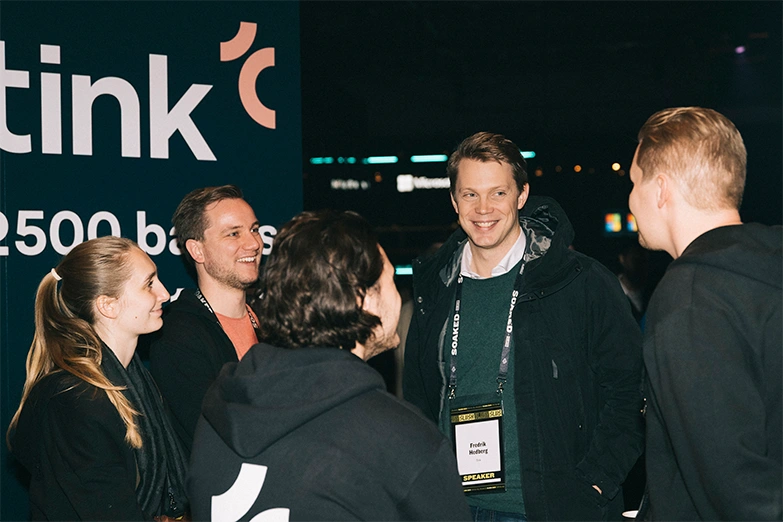3 key takeaways from Europe's biggest tech fest Slush

Over a couple of intense days, we rubbed shoulders with Europe’s tech establishment at the Slush tech conference in Helsinki. We met other innovators, took on the stage for fireside chats – and kept our ears on the ground to hear what was abuzz in the fintech circles, and what other industry experts had to say. Here are our key takeaways.
With 25,000 attendees, 4,000 startups and hundreds of world-class speakers gathered, this year’s Slush was a melting pot of inspiration. While there was more content on offer than was humanly possible to digest, here’s what truly stuck with us:
1. The next 10 years in retail banking: personal financial assistants
With its latest expansion, Klarna is looking to become a bank for millennials. No wonder then, that its CEO Sebastian Siemiatkowski was ready to offer up some bold predictions on digital commerce and the retail banking industry.
While the past two decades were all about safety and simplicity, respectively, his key trend for the next one is removing all friction from the user journey. Specifically, this means a big push into data-driven and personalised banking services.
‘The purpose of all this is to build a personal banking assistant that takes your data and uses it to create value; to automatically switch to a cheaper mortgage, to save time and money, or to improve your understanding of your economy’, the Klarna chief executive said in an interview with Wired’s editor-in-chief Greg Williams.

To this, Williams added that ‘banking is now moving beyond the single transaction’, meaning that banks and fintechs should foster long-term relationships with customers throughout the user journey – and offer a seamless user experience.
Besides the shift towards frictionless banking, Siemiatkowski said the new wave of fintech disruption will consist of the ‘more simple and boring’ cost-based innovation – namely, replacing legacy IT systems with cheaper technology.
2. European tech takes ‘leaps and bounds’ – but diversity remains an issue
Each year Slush provides a temp check on the ‘State of European Tech’ with a report compiled by venture capital firm Atomico.
The key takeaway for 2019 was (without a doubt): European tech is in a golden age.
During the past year, the continent’s tech companies attracted more than $34 billion in venture capital funding, up a whopping 40% on the previous year. In contrast, funding for US and Asian tech companies decreased year-over-year.
The fastest-growing category in Europe was fintech, boosted by megarounds into neobanks N26 and Revolut.
Reflecting on this development on stage, Stripe’s John Collison said that European tech improved by ‘leaps and bounds’ in the past decade. ‘Many companies have proven that you can get to scale in Europe [..] and there’s now a plethora of cities where you can build these companies and find a critical mass of customers.’
The Stripe CEO and co-founder also noted that tech talent now abounds in Europe: ‘We now have a great commons – of technologists, engineers, policymakers and pretty much any role you can imagine. So if you start a tech company in Europe in 2019, you can draw on experience from people who’ve already built great companies.’
Indeed, Atomico’s report says that Europe now has 6,1 million developers, compared to 4,3 million in the US.
One dark cloud loomed over the otherwise mostly positive findings in Atomico’s report: the lack of significant progress on diversity and inclusion. Despite having been a hot button issue for years, funding for startups founded exclusively by women slightly retreated during 2018, Atomico’s data revealed. Meanwhile, only 8% of venture funding went into startups with at least one female founder.
Though the D&I issue runs way deeper than women vs. men ratios – and requires extensive efforts from all industry stakeholders – it was encouraging to hear from various changemakers on the Slush stage. Among them were #ANGELS, an investment collective headed up by former Slack CPO April Underwood that aims to boost women’s equity ownership in the tech industry; and Equality Check, a Norwegian startup that has built an employee review platform focused on diversity and inclusion.
3.Trust makes data into a ‘goldmine, not a landmine’
As most aspects of our lives move online, the role of data – and the way companies should handle it – rightly keeps drawing major attention. Our own Gwen Sandberg talked about the significance of trust in open banking.
Besides presenting us with the opportunity of a lifetime, open banking also brings ‘the responsibility of a lifetime’, Gwen said on a panel with Plaid’s Keith Grose and Mastercard’s Mikko Kairtamo. ‘For open banking to work out, we need customer adoption, and for customer adoption we have to have trust. It’s our responsibility to build that trust.’
Similar ideas were aired by Amazon’s former Chief Data Scientist, Andreas Weigend: ‘Trust is much more difficult to build than to lose’,he said. ‘I think transparency is key; you need to clearly tell customers where you are going, and what you are doing with their data.’
To navigate the ‘eternal dilemma’ of balancing privacy and a personalised user experience – and make data into ‘a goldmine, and not a privacy landmine’ – the Stanford PhD came up with these three rules throughout his career:
Start with a question, not with the data. Instead of assuming that data in itself will provide wisdom, Weigend is a proponent of the scientific method: ‘Formulate a hypothesis that’s based on a question and then test it.’
Focus on decisions and actions. ‘Instead of doing McKinsey-style actionable insights from data, you need to formulate a problem specific to your industry. Then make sure you know how data will help you solve that specific problem.’
Respect and empower your customers. ‘Be really clear about what benefit you are giving to consumers. Does the user understand what he or she is getting in exchange for their data? Always keep the user’s perspective in mind.’

Bonus shoutout: Africa’s answer to Monzo?
Each year Slush organises a pitching competition where 100 startups from Europe get to try their hand in front of leading investors. This year’s winner was Eversend – a Paris-based startup calling itself ‘Africa’s first neobank.’
In her winning pitch, Eversend’s Emma Smith highlighted that while 97% of people in Africa own a mobile phone, an astounding two-thirds are still underbanked and only 7% have access to credit. With its mobile wallet, Eversend wants to close this gap.
Besides offering cross-border transactions at low fees globally, the startup runs a Monzo-type banking marketplace – connecting users with loans, insurances, virtual credit cards and other third party services. Crucially, since most Africans are still ‘offline’, the app can be used without internet access through USSD channels.
Good luck Eversend!
More in Tink news

2025-12-10
4 min read
SMEs count the cost of Brits’ ‘Fear of Messing Up’ (FOMU) at checkout
Our latest research reveals that many UK consumers feel anxious about making mistakes when paying by manual bank transfer. This lack of confidence is driving abandoned transactions and undermining trust in the small businesses they buy from – while simple human errors continue to cause failed payments.
Read more

2025-12-03
2 min read
Fidelity introduces Tink’s Pay by Bank for account top-ups
Tink and Fidelity International have partnered to enable account top-ups via Pay by Bank for Fidelity’s Personal Investing customers and advised clients on the Fidelity Adviser Solutions platform.
Read more

2025-10-30
2 min read
Coinbase and Tink partner to launch Pay by Bank crypto payments in Germany
Coinbase and Tink have partnered to launch Pay by Bank in Germany, enabling secure, fast crypto purchases directly from users’ bank accounts and expanding access to the cryptoeconomy with a seamless, mobile-first experience.
Read more
Get started with Tink
Contact our team to learn more about what we can help you build – or create an account to get started right away.
